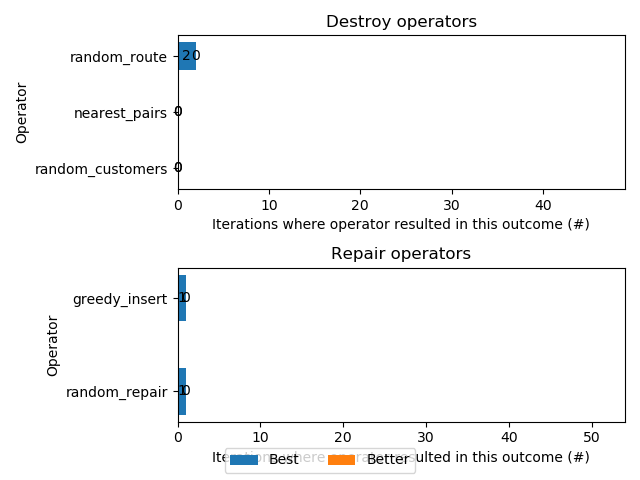alns is a general, well-documented and tested implementation of the adaptive
large neighbourhood search (ALNS) metaheuristic in Python. ALNS is an algorithm
that can be used to solve difficult combinatorial optimisation problems. The
algorithm begins with an initial solution. Then the algorithm iterates until a
stopping criterion is met. In each iteration, a destroy and repair operator are
selected, which transform the current solution into a candidate solution. This
candidate solution is then evaluated by an acceptance criterion, and the
operator selection scheme is updated based on the evaluation outcome.
The alns package depends on numpy and matplotlib. It may be installed in the
usual way as
pip install alns
Additionally, to enable more advanced operator selection schemes using
multi-armed bandit algorithms, alns may be installed with the optional
MABWiser dependency:
pip install alns[mabwiser]
The documentation is available here. If you are new to metaheuristics or ALNS, you might benefit from reading the introduction to ALNS page.
The alns library provides the ALNS algorithm and various acceptance criteria,
operator selection schemes, and stopping criteria. To solve your own problem,
you should provide the following:
- A solution state for your problem that implements an
objective()function. - An initial solution.
- One or more destroy and repair operators tailored to your problem.
A "quickstart" code template is available here.
We provide several example notebooks showing how the ALNS library may be used. These include:
- The travelling salesman problem (TSP), here. We solve an instance of 131 cities using very simple destroy and repair heuristics.
- The capacitated vehicle routing problem (CVRP), here. We solve an instance with 241 customers using a combination of a greedy repair operator, and a slack-induced substring removal destroy operator.
- The cutting-stock problem (CSP), here. We solve an instance with 180 beams over 165 distinct sizes in only a very limited number of iterations.
- The resource-constrained project scheduling problem (RCPSP), here. We solve an instance with 90 jobs and 4 resources using a number of different operators and enhancement techniques from the literature.
- The permutation flow shop problem (PFSP), here. We solve an instance with 50 jobs and 20 machines. Moreover, we demonstrate multiple advanced features of ALNS, including auto-fitting the acceptance criterion and adding local search to repair operators. We also demonstrate how one could tune ALNS parameters.
Finally, the features notebook gives an overview of various options available in
the alns package. In the notebook we use these different options to solve a
toy 0/1-knapsack problem. The notebook is a good starting point for when you
want to use different schemes, acceptance or stopping criteria yourself. It is
available here.
We are very grateful for any contributions you are willing to make. Please have a look here to get started. If you aim to make a large change, it is helpful to discuss the change first in a new GitHub issue. Feel free to open one!
If you are looking for help, please follow the instructions here.
If you use alns in your research, please consider citing the following paper:
Wouda, N.A., and L. Lan (2023). ALNS: a Python implementation of the adaptive large neighbourhood search metaheuristic. Journal of Open Source Software, 8(81): 5028. https://doi.org/10.21105/joss.05028
Or, using the following BibTeX entry:
@article{Wouda_Lan_ALNS_2023,
doi = {10.21105/joss.05028},
url = {https://doi.org/10.21105/joss.05028},
year = {2023},
publisher = {The Open Journal},
volume = {8},
number = {81},
pages = {5028},
author = {Niels A. Wouda and Leon Lan},
title = {{ALNS}: a {P}ython implementation of the adaptive large neighbourhood search metaheuristic},
journal = {Journal of Open Source Software}
}

